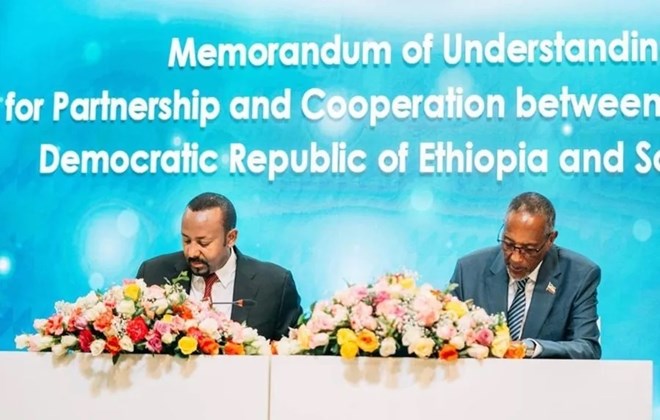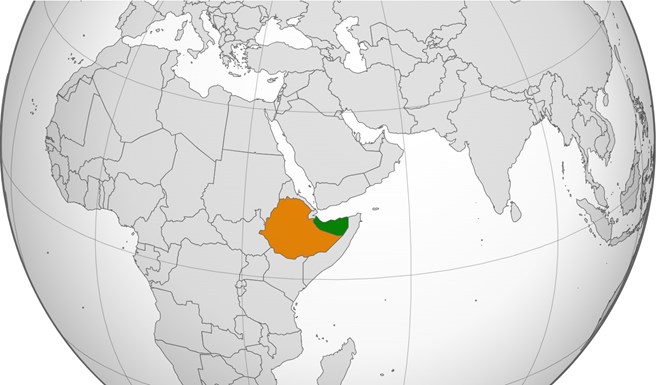
Monday January 1, 2024

Ethiopian PM Abiy Ahmed and Somaliland President Muse Bihe Abdi sighing the MoU in the Ethiopian Capital Addis Ababa on January 1, 2024 (Photo : PD)
Mogadishu (HOL) - Ethiopia has signed a Memorandum of Understanding (MoU) with the self-declared Republic of Somaliland. The maritime agreement, orchestrated by Prime Minister Abiy Ahmed and Somaliland President Muse Bihi Abdi in Ethiopia's capital, Addis Ababa, is set to alter the Horn of Africa's geopolitical landscape dramatically.
Landlocked Ethiopia, with over 100 million inhabitants, has long sought access to the sea, a quest intensified following Eritrea's secession in the early 1990s. Since then, Ethiopia has predominantly relied on Djibouti for its maritime trade, a dependency it has aimed to diversify. The MoU with Somaliland, a region that declared autonomy from Somalia in 1991 but lacks widespread international recognition, marks a pivotal turn in these efforts.
"Today, it is with immense pride that I announce the mutually beneficial agreement between Somaliland and Ethiopia. In exchange for 20km sea access for the Ethiopian Naval forces, leased for a period of 50 years, Ethiopia will formally recognize the Republic of Somaliland, setting a precedent as the first nation to extend international recognition to our country," said Somaliland President Muse Bihi Abdi.
Under the MoU, Ethiopia gains naval and commercial access to Berbera, a strategic port on Somaliland's coast along the Gulf of Aden. In exchange, Ethiopia will recognize Somaliland's independence, a significant move given Somaliland's three-decade quest for international recognition.
The deal entails Ethiopia gaining access to a leased military base on the Red Sea, enhancing its regional strategic presence. Furthermore, Somaliland will receive a stake in state-owned Ethiopian Airlines, fostering deeper economic collaboration. This multi-faceted agreement, hailed as a 'game-changer' by Somaliland officials, paves the way for Ethiopia to secure diversified access to seaports, mitigating its vulnerability.
The Ethiopian Prime Minister's office described the agreement as a significant diplomatic victory, emphasizing its potential to usher in a new chapter of cooperation and regional integration in the Horn. Prime Minister Abiy Ahmed, in a statement, underlined the existential importance of sea access for Ethiopia, a sentiment he had voiced previously, stirring regional apprehensions. However, the Ethiopian government reassured its neighbours of its commitment to peaceful diplomacy in an attempt to dispel fears of territorial expansion.
While not legally binding, the MoU sets the stage for a potential treaty, imposing obligations on the signing parties. As per Abiy's national security adviser, Redwan Hussien, the agreement's details will be formalized in a follow-up meeting next month.
Somaliland's pursuit of international recognition has been a central theme in its foreign and domestic policy since its declaration of independence. Formal recognition by Ethiopia, a key regional player, is likely to bolster Somaliland's position in its ongoing dialogue with Somalia, despite the latter's firm assertion of territorial sovereignty over Somaliland. The Somali government, reacting to the MoU, announced an emergency cabinet meeting on Tuesday, signalling the sensitivity of the agreement in the region.

A map of the location of self-declared Somaliland, shown in green, and Ethiopia shown in orange. by Dim Grits
The MoU between Ethiopia and the self-declared Republic of Somaliland has ignited a firestorm of reactions from prominent Somali politicians and thinkers. These reactions, ranging from condemnation to calls for unity, underscore the deep-rooted concerns about Somalia's sovereignty and regional stability.
Former President Mohamed Abdullahi Farmajo, known for his close alliance with Ethiopian President Abiy Ahmed, released a scathing statement, criticizing the deal as a "grave implication" that violates Somalia's independence and unity. He emphasized the need for Ethiopian restraint and urged Somali Parliament members to uphold the nation's sovereignty, especially in the wake of the maritime dispute resolution against Kenya. Farmajo's call for unity among Somali citizens and authorities to protect their land and sea reflects a deep-seated apprehension about the agreement's ramifications.
"Somalia is indivisible. Its sovereignty and territorial integrity is uncompromisable," said Abdirizak Omar Mohamed, Somalia's petroleum and mineral resources minister and President Hassan Sheikh Mohamud's close confidante.
Echoing this sentiment, Abdikarim Hussein Guled, Special Presidential Envoy for Somaliland and former president of Galmudug State of Somalia, described Ethiopia's actions as a "blatant disregard for international norms" and a threat to Somali territorial sovereignty. He warned that this move could destabilize the region and undermine progress in dialogue between the Federal Government of Somalia (FGS) and Somaliland.
Abdirahman Abdishakur, leader of the Wadajir Party and Member of Parliament, accused the Ethiopian government of violating Somali sovereignty and disregarding international regulations. His statement reflects a growing consensus among Somali leaders about the perceived threat posed by the agreement to the nation's territorial integrity.
Former Prime Minister Omar Sharmarke called for swift and direct action from the Somali government, stressing the urgency to address this "provocation by Ethiopia" that undermines Somalia's unity and territorial integrity.
Researcher and Somalia analyst Abdirashid Hashi vehemently opposed the agreement, proclaiming it Ethiopia's declaration of war on Somalia. He confidently stated that Ethiopia cannot seize Somali territory and emphasized the historical resilience of Somalis in defending their land.
Abdi Aynte, a former UN official and co-founder of the Heritage Institute of Policy Studies, highlighted the potential for a political crisis in the Horn of Africa due to Ethiopia's "provocative step." He advocated for Somalia to respond swiftly and proportionally to Ethiopia's actions.
Even Al-Shabaab, the militant group waging an insurgency against the Somali government, has entered the fray. The group's spokesman and senior official, Ali Rage, categorically rejected the Ethiopia-Somaliland MoU, calling it a violation of Somali maritime territory and sovereignty. He threatened violence to oppose the agreement and accused Somali authorities of facilitating the deal.
The agreement, arriving days after a breakthrough in talks between Somalia and Somaliland in Djibouti, also carries implications for regional diplomacy. It underscores the shifting dynamics in the Horn of Africa, where nations are increasingly seeking strategic partnerships to advance their national interests. Ethiopia's move to secure sea access through Somaliland, while addressing its economic constraints, also threatens broader regional stability.